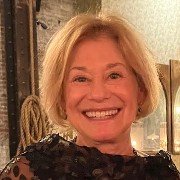- Renée Sackey, Women of Vision Past Chair
I am truly humbled during this season of Rosh Hashanah and Yom Kippur. Not that I haven't been awed in past years by the solemnity of this time for reflection and renewal, but it has taken on a deeper meaning for me this year.
Why?
In past years, as I sat in synagogue on the high holidays, my mind was racing—is the brisket overdone, are the matzoh balls fluffy, did the flowers arrive. Do I have enough food for my 35 family members and friends?
But this year as I sat in synagogue on Rosh Hashanah, I felt a sense of peace.
Part of the reason is where I am in my life now. I recently celebrated a big birthday. I am blessed with wonderful children and grandchildren, I have a great life partner, and I have weathered many of life’s ups and downs. I have reached the point of “elder statesperson,” able to say no to things for which I no longer have a passion, and yes to things I do.
And Women of Vision falls squarely in the “I have a passion” category.
These 10 days of awe—of t’shuvah—t’fillah—t’zedakah—tie into the mission of Women of Vision , which is to benefit the lives of self-identifying jewish women and girls through social change and social justice.
T’shuvah, which is generally thought to mean “repentance” derives its root from the hebrew word meaning “return.” In that way, we can interpret ‘t’shuvah” as returning to what is the essence of being a jew and the values we hold dear, such as tikkun olam (repairing the world), kavod (respect), gimilute chasadim (acts of loving kindness), pekuach nefesh (saving a life). Aren’t these the values that have guided us through the past 30 years in our grant-making and advocacy?
T’fillah, which is generally defined as “prayer” also takes on additional meaning. When we pray, we are joined with Hashem, and when we spend valuable time reading Letters of Intent, discussing the details of proposals, and meeting grantees, we are fulfilling G-d's work.
T’zedakah is commonly referred to as charity. But tzedakah is more than that. It connotes a sense of justice. It is in our DNA as jews to pursue justice, and again, through our grantmaking and advocacy, we have made grants totaling over $1.6 million over the past 30 years to organizations that have furthered Women of Vision’s goal of social change and social justice.
In wrapping up, when I look back on these past 30 years, I am truly humbled by the dedication and commitment of us women. When Sally Cooper Bleznak founded Women of Vision, there were a few hundred members and our first grant of approximately $16,000 went to JEVS for women who were survivors of domestic abuse to help them create independent lives for themselves by learning computer and career-readiness skills to compete in the workplace.
We have grown exponentially in membership, in dollars, in community recognition, and in impact both in the Greater Philadelphia area and Israel.
These days of awe are a time for personal reflection and accounting. Let us each take stock of where we have been and strive to be better.
May each of us be inscribed and sealed in the book of life for a good year and may we as Women of Vision together go from strength to strength.
Amen.
***
Women of Vision impacts the lives of self-identifying Jewish women and girls across generations and geographic boundaries through strategic grantmaking, advocacy and educational programs leading to social change and social justice. You can learn more about and become a member of Women of Vision by clicking here or by reaching out to Shara Swift, Director of Women of Vision and Campaign Pipeline, at sswift@jewishphilly.org or 215.832.0841.



